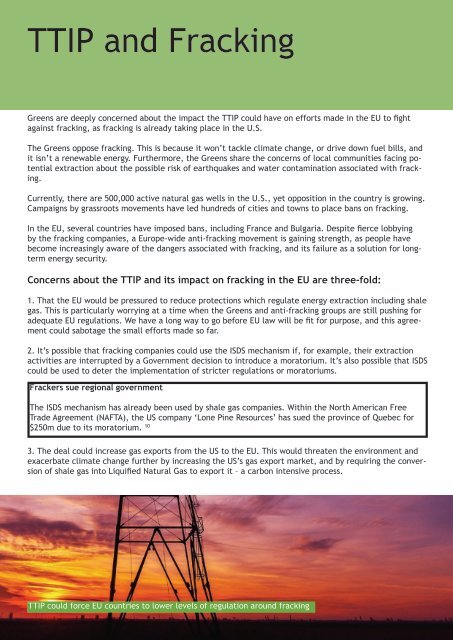TTIP FINAL
TTIP FINAL
TTIP FINAL
Create successful ePaper yourself
Turn your PDF publications into a flip-book with our unique Google optimized e-Paper software.
<strong>TTIP</strong> and Fracking<br />
Greens are deeply concerned about the impact the <strong>TTIP</strong> could have on efforts made in the EU to fight<br />
against fracking, as fracking is already taking place in the U.S.<br />
The Greens oppose fracking. This is because it won’t tackle climate change, or drive down fuel bills, and<br />
it isn’t a renewable energy. Furthermore, the Greens share the concerns of local communities facing potential<br />
extraction about the possible risk of earthquakes and water contamination associated with fracking.<br />
Currently, there are 500,000 active natural gas wells in the U.S., yet opposition in the country is growing.<br />
Campaigns by grassroots movements have led hundreds of cities and towns to place bans on fracking.<br />
In the EU, several countries have imposed bans, including France and Bulgaria. Despite fierce lobbying<br />
by the fracking companies, a Europe-wide anti-fracking movement is gaining strength, as people have<br />
become increasingly aware of the dangers associated with fracking, and its failure as a solution for longterm<br />
energy security.<br />
Concerns about the <strong>TTIP</strong> and its impact on fracking in the EU are three-fold:<br />
1. That the EU would be pressured to reduce protections which regulate energy extraction including shale<br />
gas. This is particularly worrying at a time when the Greens and anti-fracking groups are still pushing for<br />
adequate EU regulations. We have a long way to go before EU law will be fit for purpose, and this agreement<br />
could sabotage the small efforts made so far.<br />
2. It’s possible that fracking companies could use the ISDS mechanism if, for example, their extraction<br />
activities are interrupted by a Government decision to introduce a moratorium. It’s also possible that ISDS<br />
could be used to deter the implementation of stricter regulations or moratoriums.<br />
Frackers sue regional government<br />
The ISDS mechanism has already been used by shale gas companies. Within the North American Free<br />
Trade Agreement (NAFTA), the US company ‘Lone Pine Resources’ has sued the province of Quebec for<br />
$250m due to its moratorium. 10<br />
3. The deal could increase gas exports from the US to the EU. This would threaten the environment and<br />
exacerbate climate change further by increasing the US’s gas export market, and by requiring the conversion<br />
of shale gas into Liquified Natural Gas to export it – a carbon intensive process.<br />
<strong>TTIP</strong> could force EU countries to lower levels of regulation around fracking


